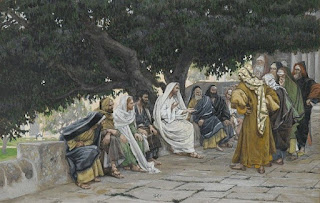In many dominator societies, then and now, marriage provides an economic safety net for women. Divorced women could remarry to allow them the safety net marriage provided. Widows could also remarry for the same reason, levirate marriages being the best example.
In Sunday's lection from Mark 10, Jesus was asked about divorce by some married Pharisees who already knew the answer. They actually knew two answers to their question. (Yes to divorce because of the wife's adultery, and yes to divorce because of the wife's adultery and other things the husband finds objectionable about her.) Deuteronomy 24, which the Pharisees were alluding to, specifies that only husbands can divorce their wives.
Jesus, in a later conversation with the disciples, says wives can choose to divorce their husbands.
Choices play a primary role in this pericope. Divorce is a choice. The option started with Moses. Marriage is a choice, and is arguably the better choice for Jesus since this option has God's blessing. Unfortunately, many times, only the men get to choose either.
In the Philippines, there is no option to choose divorce because men in power decide which laws to pass. And they choose not to pass any law on divorce. They make the options that do exist-- annulment and legal separation-- costly and lengthy. They cover their ears to the cries of abused spouses-- especially wives-- and make a big show of using the law to protect the integrity of marriage and family. They forget that God knows how abusive spouses are themselves breaking apart what God made one.
I am sure that there are a lot of people who would disagree with Jesus's reasoning on this particular matter. I do. And it's perfectly okay. In Mark 12, a group of married Saduccees come to Jesus with a question about a woman who had to be married to seven husband's one after the other. I love Jesus's response in that episode.
In the end, no one, especially a man, has the right to take away a woman's autonomy and freedom to choose.
*art, "Jesus on Divorce, Remarriage, and Adultery," (Marg Mowczko).









